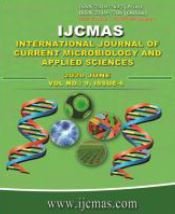


 National Academy of Agricultural Sciences (NAAS)
National Academy of Agricultural Sciences (NAAS)

|
PRINT ISSN : 2319-7692
Online ISSN : 2319-7706 Issues : 12 per year Publisher : Excellent Publishers Email : editorijcmas@gmail.com / submit@ijcmas.com Editor-in-chief: Dr.M.Prakash Index Copernicus ICV 2018: 95.39 NAAS RATING 2020: 5.38 |
Collar rot or damping off disease occurs on one to four month old tender coffee (Coffea Arabica) seedlings in the nursery. Sometimes, the collar rot pathogen infects coffee seeds sown on the seed beds and prevents the germination. However, the pathogen fails to establish in coffee seedlings when the stem at collar region turns brown in color and becomes harder. It is a soil inhibiting fungus with a wide host range including coffee. Collar rot disease is the most economical disease in coffee seedlings in India. The disease is caused by fungi Rhizoctonia solanai. The coffee growers apply chemical fungicides to control this pathogen. Hence development of alternatives to chemicals for the disease control is very much required. As an alternate strategy use of efficient strains of Trichoderma harzianum, Pseudomonas flurocense, Bacillus subtilis and Agrobacterium tumifaciense as bio control agents through effective formulations would be needed for proper control of collar rot in coffee. The strains were isolated and screened by antagonist activity test against R. solanai pathogen and encapsulated for field application. The efficient strains such as T. harzianum, P. flourocens, B. subtilis, and A. tumifaciense have been formulated in the form of solid, bioencapsulation for increasing the shelf life, facilitate easy application and effective control of collar rot disease. The formulated bio control agents were tested for their shelf life and field efficacy on the seedlings. The results of shelf life and disease incidence score revealed that the encapsulated formulations performed well in controlling the collar rot problem in coffee.
 |
 |
 |
 |
 |